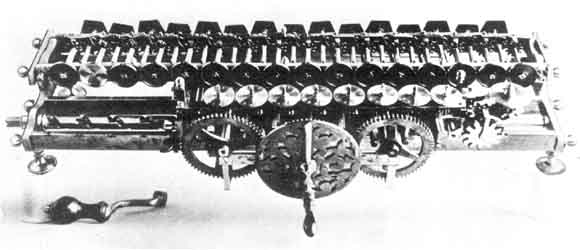 |
| The Leibniz Calculating Machine |
Unlike formal logic systems, however, the universal language would also express the content of human reasoning in addition to its formal structure. In Leibniz's mind, “this language will be the greatest instrument of reason,” for “when there are disputes among persons, we can simply say: Let us calculate, without further ado, and see who is right”So what if Leibniz was right? What would happen? It would be the end of faith. Every question could be resolved by reason. That would make some people happy, I know. It would also be the end of freedom. Why? Because we are incapable of deliberately thinking against reason. We can act against reason. We can smoke even when we know smoking is stupid. But we can't choose to believe smoking is good when we are aware of a solid logical argument that says it is not good.
People get frustrated by faith. They want things to be clear. They want certainty. They don't think faith can give them that the way reason can. But what would happen to our freedom in a world like that? Where every question could be resolved by doing a calculation? Which is the true religion? There would be no debate. The calculation would be done and the matter would be resolved. So would we have freedom of religion? Not really. We could believe in a false religion if we wanted but we would know it is false. Nobody is going to follow a religion they know is false.
I know people think about that and immediately assume it would be wonderful. They assume their religion would be proved right and all other religions would be proved wrong. I have had the experience of being drawn by reason to leave the religion I loved and embrace a new religion. OK not totally new, still within the bounds of Christianity but it felt very new to me. My point is that I was drawn to conversion. I was never compelled to convert by irrefutable logic. It was my choice. If it was proved to me so that there was no choice then I would have entered the Catholic church very differently. Like the difference between marrying the love of your life and marrying someone you parents chose for you.
I think there is some of Leibniz in all of us. I know there is in me. We want to calculate. We want to find a compelling logical proof that our faith is right. To the point where it would not be faith anymore. So that every logical mind would have to accept our argument. Part of it is we don't want to admit to faith. We are really buying into the modern world and life view that faith is inferior to reason. That really competent people don't need faith. We consciously reject that but at some level we are still embarrassed to say we are at a place of faith seeking understanding.
I might be misreading you, but I think there is a problem with your argument. You seem to be saying that if person is unable to go against what they know to be true, then they're not truly free. Pope Leo XIII quoted St Augustine on this very point, who said that argument cannot be right, because God is supremely free and is unable to go against what He knows to be true. So being free does not depend on being able to choose the wrong, it means being able to choose between different goods. The fact we can choose the wrong is a limitation/defect due to the fact we are finite: which is why even when we choose what we know is wrong, we do so seeing some apparent good in the choice.
ReplyDeleteWhat you seem to really be getting at is that there is a real distinction between faith and reason, between the super-natural and the natural. If everything could be explained in terms of the natural, then there would be no super-natural, and thus everything could be explained by reason and faith would be unnecessary. This is essentially the Protestant and Enlightenment errors, where they conflated the natural and super-natural into one. The Protestants said only faith; the Enlightenment said only reason; but they were both wrong because they mistakenly collapsed the natural and super-natural orders.
Reason can grasp and prove that there is God, that He is the Supreme Being, etc, but it can only go so far. We could never know that God is Three Persons apart from Divine Revelation.